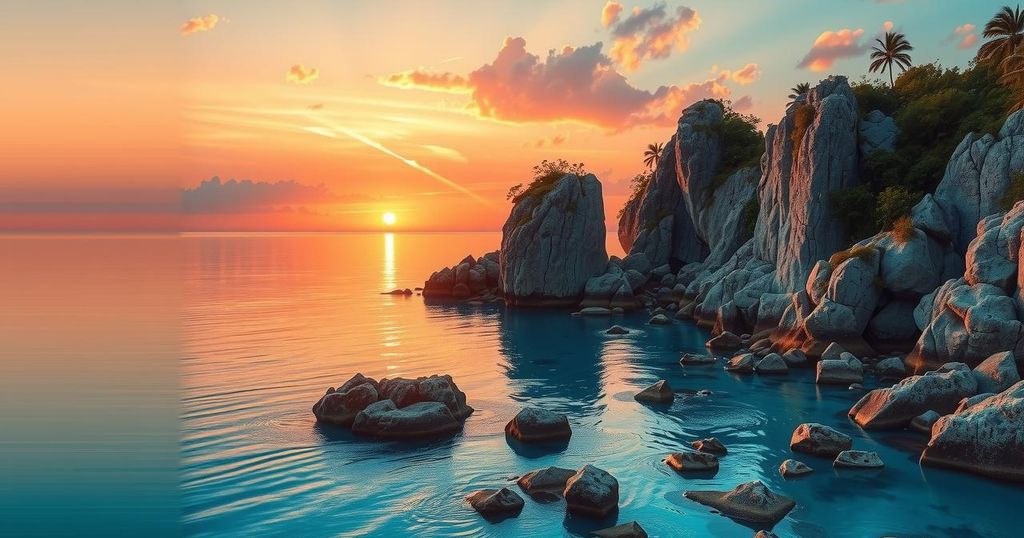Serua Island Faces Critical Climate Challenges Amid Growing Sea Levels
Serua Island in Fiji is grappling with the dire effects of climate change and rising sea levels. Elders like Waisale Natuna express concerns over government inaction, citing inadequate infrastructure like seawalls and the relocation of families to the mainland. Despite these challenges, residents are committed to preserving their cultural heritage and taking matters into their own hands, emphasizing the deep connection they have to their land.
Climate change remains a pressing concern, perhaps the most critical issue that humanity currently faces. As the consequences of climate change become more apparent, the landscape of environmental diplomacy has shifted dramatically since the Paris Agreement was enacted in 2015. Once a prominent advocate for climate action, the United States has shifted away from its leadership role, leaving a void as global priorities have turned instead to tariffs, conflicts like those in Gaza and Ukraine, and economic isolationism under the Trump administration.
Extreme weather events have increasingly wreaked havoc across the globe. The polar ice caps are melting at an alarming pace, while ocean waters continue to rise, evoking a silent but undeniable threat. In Fiji, Serua Island is facing significant challenges due to encroaching seawater and shifting weather patterns that threaten the local populace and their traditional ways of life. This island, which lies not far from Viti Levu, holds deep cultural value as the historic residence of the paramount chief of Serua Province.
Recently, members of The Sunday Times visited Serua Island to observe firsthand the effects of climate change. Tour guide and village elder Waisale Natuna, a former village headman, explained that the island is now home to just over 100 households, many of whom have relocated to the mainland village of Talenaua. “In every family, one sibling is chosen to care for the family home here, while others have moved to the mainland,” Natuna shared, providing insight into the shifting demographics that climate change has prompted.
He reminisced about the devastating cyclone in the 1980s that caused widespread flooding on the island, impacting even schools far inland. That disaster heightened awareness among the islanders regarding the urgent need for preemptive action against unpredictable climate events. Among the efforts undertaken, a government-funded seawall on the western side of the village was constructed to combat rising tides. However, its efficacy has been questioned.
Joseva Robanakadavu, the spokesperson of the Vunivalu, noted that the seawall seems to actually exacerbate flooding during high tide due to flawed engineering. “The wall has no outlets, causing water to accumulate in the village,” he explained. This accumulation leads to unstable ground and concerns over soil erosion.
Two prominent hills on the island, Navua and Dakuiserua, have suffered from heavy rains contributing to landslides, an issue worsened by rising sea levels. Natuna indicated plans are underway to plant vetiver grass around Dakuiserua to help improve soil stability and prevent further slides. He also raised alarms about the eastern side of the island, which remains vulnerable without an effective seawall.
A temporary solution involving large rocks placed along this shoreline has proven insufficient according to Natuna. “The entire island needs a properly engineered seawall,” he stated firmly. While community leaders concede their reliance on government support, they emphasize their determination to fend for themselves. Natuna discussed the Integrated Village Development Plan proposed by his community, aimed at raising the land and improving infrastructure to better combat climate threats.
Though Serua Island has historically been accessible by a brief boat ride, relocating its residents has been ruled out. Natuna articulated the strong ties between the land and the people, asserting that this island is part of their identity and cultural heritage. “Our connection to this land and sea is profound,” he asserted. Despite drawing attention to climate concerns, Natuna and the village elders are committed to acting on their own desires for the preservation of their home, rather than waiting for government intervention.
Serua Island is emblematic of the broader struggles faced by communities in the wake of climate change. As sea levels rise and extreme weather threatens their homes, the residents, particularly under the guidance of elders like Waisale Natuna, are determined to safeguard their cultural heritage. With limited governmental support, the villagers are taking proactive measures, but the challenges are formidable. Their fierce attachment to their land underlines the critical balance between identity and survival in the face of environmental adversity.
Original Source: www.fijitimes.com.fj




Post Comment